Josh Brolin Milk Interview

BROLIN CONTINUES TO TAKE RISKS IN NEW 'MILK' ROLE.
Josh Brolin, Milk Interview by Paul Fischer.Fresh from his critically acclaimed role in W, Josh Brolin is having the time of his lifge these days, both personally and professionally. Now taking on the tough role of Dan White in Gus van Sant's Milk, Brolin continues to receive acclaim for playing roles that are complex, controversial and fascinating. Paul Fischer caught up with the actor.
QUESTION: WHICH CHARACTER WAS MORE HATEFUL TO PLAY: GEORGE W. BUSH OR DAN WHITE?
JOSH BROLIN: Neither.
QUESTION: WHY IS THAT?
JOSH BROLIN: Because I don't hate either one of them personally. I find them both very sad and a little pathetic. I think I understand them. The thing with these characters and it's one of the reasons why I chose to do both of them, and the choice to do Dan White was immediate. I read the script and then I watched the '84 documentary with my daughter and we were both crying by the end of it and I cried when I read the script. Gus [Van Sant] sent it to me. There was no thinking involved in that one. I just said, 'Yes, absolutely -' and there was also Gus and Sean [Penn] and Emile [Hirsch], the whole deal. 'W.' was a different thing. I said no, no, no, no and then I read the script and I thought, 'Wow, this is a very interesting challenge for an actor and it's not just about him and the last seven years that I have very strong feelings about politically.' It got into the person and brought up the question how this guy becomes president, this guy who's floundering and just kind of traveling through this labyrinth looking for his niche. Then it became interesting and it starts to humanize him. So to answer your question, once you humanize them both you start to see, 'Oh, are they totally to blame?' With the pressures that Dan White had from the police force, from the fire department, from all of that - he tried to resign. They didn't let him resign. Then he tried to get back in and then Moscone wouldn't let him back in. The fact that he couldn't feed his family and that on Pier 39 he had the ship stand going on, trying to make more money, you start to realize on a very human level with them. Not that I agree with it. Obviously it's extreme, but you start to understand that it was his only way to garner back any power. He had lost all his power, this guy who was so charming, who was praised his entire life. He was suddenly this small fish in this huge pond in city hall. So what best to do in order to do something tangible? Grab a gun. Load the gun. Point the gun. Shoot the gun. Kill the person. Beginning, middle and end. Do you know what I'm saying? I'm not saying it's okay, but once you play a part like that you can't just [growls] because people will go, 'That's pretty one dimensional.'
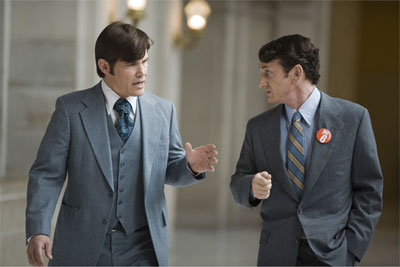 QUESTION: IS IT IMPORTANT TO BE EMPATHETIC THEN WHEN YOU'RE DOING CHARACTERS LIKE THOSE?
QUESTION: IS IT IMPORTANT TO BE EMPATHETIC THEN WHEN YOU'RE DOING CHARACTERS LIKE THOSE?JOSH BROLIN: I find it more interesting because then there are more colors to what you're playing. People ask if I feel that Dan White was a latent homosexual. First of all who cares. Second of all, if we're going to get into that the only time that I even thought about that was a scene that Sean and I really started kind of adlibbing on which was a fairly straight scene during his birthday where we meet in that empty lobby. It's a very strange and absurd scene. It's creepy to me when I watch it. That scene was written that I see him and I'm a little angry at him because he didn't vote on my bill. I'm late to his birthday. I take out a bottle of alcohol and I give it to him for his birthday. I thought that was kind of boring. I thought, 'Why don't I be drinking the alcohol just out of resentment, the resentment that's brewing in there.' Then whatever comes out of that could come out of that. Then there's looks that I gave Sean that I'll never forget. Sean was looking at me and it was no longer acting. He was looking at me like, 'What's happening?' We were sitting there and I was staring at him for a long time and I didn't know if that came from the need to connect and whether that has a latency to it or the resentment of wanting to be liked and knowing that he's afraid of me. There's a complexity that comes out of that.
QUESTION: SO YOU'VE PLAYED THESE TWO CHARACTERS THAT ARE WEAK AND PATHETIC IS THAT OUT OF YOUR SYSTEM NOW?
JOSH BROLIN: Weak? Not George W. Bush. Yes for Dan, but not for George. Is out of my system? I didn't need to play those characters. It's not a Freudian thing for me. They were just of behavioral interest. That's it.
QUESTION: HOW DID THAT '84 DOCUMENTARY SHAPE THE WAY THAT YOU PLAYED THE CHARACTER OR DID IT AT ALL?
JOSH BROLIN: Only in that I wanted to do it. I wanted to do it after I read the script, but when I sat down with my daughter and watched the documentary I was extremely moved. I mean, extremely moved. I said, 'I have to play this character.' Then something happened to me as a kid, and I won't tell you who it is, but I got a haircut when I was in the whole punk rock thing. It was the beginning of that whole deal and some older gentlemen said that I looked like Harvey Milk and I didn't know who Harvey Milk was at the time. Later on I remember that comment and so I did it just to spite that guy. I don't like the discrimination at all, especially that he was using that to say basically that I looked like a fag.
QUESTION: SOME PEOPLE COMPLAINED THAT YOUR PORTRAYAL OF W. WAS TOO SYMPATHETIC. DO YOU THINK SOME PEOPLE MIGHT GO INTO THIS AND SAY THAT YOU MADE DAN WHITE TOO HUMAN IN THIS INSTANCE?
JOSH BROLIN: Sure. I think that's a possibility. I also think that it's a possibility that Obama gets elected and people are frothing at the mouth with hatred. I don't get it. I just don't understand. So regardless of whether you like the guy or not, I'm listening to talk radio and listening to those people and I'm just like, 'Wow, the anger.' So, yes, I think that's a possibility. I don't agree with it. It's always been a thing for me. I played a child molester, a guy who was in a psych ward when I was doing theater and during the play and I remember that they wanted me to play it like that, like Nicholson or something and I just said, 'I think it's more interesting if I can get five mothers who want to fix me it's more confusing and it's more interesting.' That's just me.
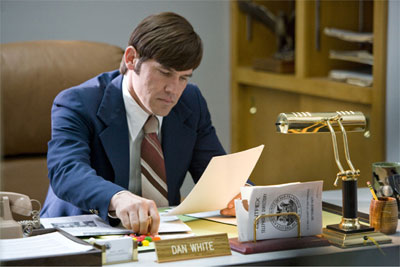 QUESTION: GIVEN RECENT POLITICAL EVENTS IN THE STATE IS IT SAD THAT THIS FILM REFLECTS SOMETHING THIRTY YEARS AGO AND NOW WE SEE THAT THINGS REALLY HAVEN'T CHANGED?
QUESTION: GIVEN RECENT POLITICAL EVENTS IN THE STATE IS IT SAD THAT THIS FILM REFLECTS SOMETHING THIRTY YEARS AGO AND NOW WE SEE THAT THINGS REALLY HAVEN'T CHANGED?JOSH BROLIN: They have changed, but they haven't changed, you're right. It was very surprising to me that Prop 8 ended up being a yes. In Massachusetts, no. They still allow gay marriage there. It's very interesting to me. I don't quite understand it and I started looking into it just because I was very curious and confused and then you start to find out that seventy percent of African Americans voted yes on 8 and Latinos and then you realize the religious connection and the God-fearing thing.
QUESTION: WAS IT A SHOCK THAT IT HAPPENED IN THIS STATE?
JOSH BROLIN: To me, yeah. Very surprising. What I'm happy about other than the traffic is that people are getting out there and having their voices heard and protesting. Like Howard Zinn says, 'Democracy comes from the bottom and not the top.' I love that people are out there voicing their opinions.
QUESTION: HOW DO YOU FEEL ABOUT THE MORMON CHURCH BACKING THAT?
JOSH BROLIN: I don't know, man. I have no connection with the Mormon church. They have their own value system. They do whatever they have to do and I feel extremely bad for the gay community. I feel I think worse for the gay community that someone who knows discrimination better than anyone, the African Americans and Latinos, feel that the gay community is not a part of that, that it's not a civil rights issue. I believe it is.
QUESTION: DO YOU THINK IF THIS FILM WAS RELEASED A LITTLE EARLIER THAT IT MIGHT'VE HAD AN IMPACT ON PROP 8?
JOSH BROLIN: I don't know. Did the release of 'W.' have an impact on the election? I don't know. Some people say absolutely and some people say no. I don't know.
QUESTION: YOUR CAREER HAS REALLY TAKEN OFF IN THE LAST YEAR. HOW SURPRISED ARE YOU BY THAT AND WHAT ARE YOU LOOKING TO DO NOW TO CHANGE IT UP?
JOSH BROLIN: I wouldn't go so far as to say surprised. Pleased. Humbled. Grateful. I'm very grateful. I love working with the people I've been working with. They're amazing. It's easier to work with these types. They love filmmaking and it's about the filmmaking and not the ego and not the status and not the power struggles. What am I going to do next? I have no freaking clue. I don't know.
QUESTION: 'JONAH HEX'. ARE YOU IN?
JOSH BROLIN: Don't know. Truly.
QUESTION: DO YOU EVER WANT TO DO THINGS WITH YOUR WIFE?
JOSH BROLIN: I do things with my wife [laughs]. Don't be crass, Brolin. She'd laugh. I can't imagine working with my wife as actors. I just don't think we could do it. I think we'd laugh the entire time. I just can't imagine doing it. We're very lucky. When you start a relationship based on working together that's one thing. We don't have that. We've talked about it. I can't imagine it and we both immediately go, 'That's stupid.' I'd like to direct her in something, a play or something like that.
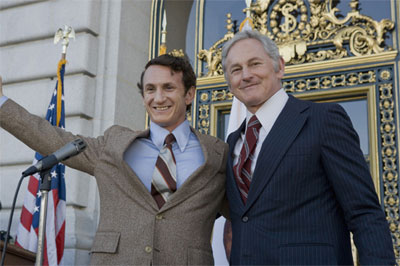 QUESTION: AND THE LAUGHING WOULD STOP THEN?
QUESTION: AND THE LAUGHING WOULD STOP THEN?JOSH BROLIN: Yeah. I'd like her to direct me in something.
QUESTION: WHAT WAS IT LIKE WORKING WITH SEAN? IS HE SERIOUS ON THE SET? HE SEEMS TO BE SUCH A SERIOUS PERSON.
JOSH BROLIN: I know he does and he's not. He's the most gracious actor I've ever worked with bar none. He's the most giving and gracious actor I've ever worked with. He's just an incredible human being, an incredible human being. That dude gets a bad rap and I do not understand it. He doesn't come to these things and I understand it. It's probably better that he doesn't. He doesn't pander and he gets slammed for it. He loves the work. He's an obsessive storyteller. He loves it. He's obsessed by it just like Oliver Stone, just like the Coens and it's great being around people like that if you're a geek like me who truly in the most nerdish way love to sit down and create something together.
QUESTION: HOW DID THE RELATIONSHIP YOUR CHARACTERS HAVE WITH EACH AFFECT THE RELATIONSHIP YOU TWO HAD ON SET?
JOSH BROLIN: I didn't interact with a lot of people during shooting. Sean and I know each other loosely. We're much closer now, but we've known each other off and on since we were kids. When we were shooting we didn't talk a lot. Once in a while. But when you're doing a role like that, I mean for Sean and Emile and James Franco and all of that it was more of a celebratory thing. They have their obstacles, but they're breaking through these obstacles. There's a very strong trajectory. With mine it's the opposite and so I did try to isolate myself a little bit and it seemed to work. I only had to do scenes with Sean, which was great because he's willing to go anywhere and we adlibbed a lot. I'd go in that direction and he'd go over here. So it was a great emotional dance.
QUESTION: WERE ALL THOSE ENCOUNTERS THAT YOU AND MILK HAD BASED ON REAL MEETINGS?
JOSH BROLIN: Not necessarily, no. I mean, the news snippets were verbatim. I tried to stick to that as much as I could and then you take your liberties and create what you think would've happened or talk to people. The thing with 'W.' was that it was much more closely based in reality than the meetings between Dan and Harvey, but it was based on something. You talk to people and you read the books and you go, 'Oh, this happened.' Obviously it's not verbatim.
QUESTION: 'W.' DIDN'T TAKE AS MANY LIBERTIES?
JOSH BROLIN: I don't know. I can't say that for sure. I don't know with this movie as much as I do with 'W.', but with 'W.' it was pretty close with the exception of some situation room scenes and all of that.
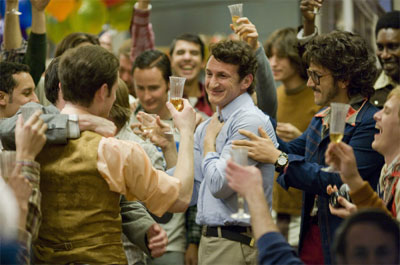 QUESTION: HOW DO YOU FEEL ABOUT THE CHORUS THAT STONE WAS WAY TOO SOFT ON BUSH?
QUESTION: HOW DO YOU FEEL ABOUT THE CHORUS THAT STONE WAS WAY TOO SOFT ON BUSH?JOSH BROLIN: Let me put it this way. When 'No Country For Old Men' came out people said, 'Josh, how do you feel that ending is so f---cked up?' But you're still talking about it and that's the point. The thing that it's too soft, I don't know. Oliver is older now and I'm sure that there's a soft spot in Oliver that maybe was recently revealed and I don't think that he has a soft spot for Bush at all, but I think the question, again, going into this movie is how did this guy get elected? How can we follow and learn from this? Instead of sitting there and pigeonholing and pointing the finger and all that kind of stuff that we're all so good at it, by writing him off it takes the responsibility away from us when in essence it is our responsibility. We're the ones that voted him in. Ballot manipulation - whatever. Still, 45 million people voted for this f---cking guy. So it brings up an interesting question. Why at that moment in our history did we go, 'We want the fallible guy. We want the guy that's not the elitist. We want the guy that we feel we can have a beer with. We want the guy elected that we feel we could be elected some day -' or whatever that is. That's the more interesting question. And Oliver has slammed enough people.
QUESTION: HOW DO YOU THINK HISTORY WILL ULTIMATELY JUDGE BUSH?
JOSH BROLIN: I think it's pretty evident right now. From a 90 percent approval rating to a 25 percent approval rating. It's something that he brings up a lot. 'You can't judge me now. There needs to be hindsight in order to judge me. You may look back and realize that I actually had good intentions and that I actually stopped more mayhem and more blood from spilling -' and all this kind of stuff. So my feeling immediately is not so well, but who knows.
QUESTION: CAN YOU TALK ABOUT SOME OF THE UNIVERSAL THEMES IN 'MILK'?
JOSH BROLIN: Look, it's happening right now with Prop 8. People have different feelings and the universal theme is that as a couple, if you're happy and if you're not hurting anyone else what's the problem, but that's my own personal feeling. A Mormon might feel differently. A Mormon feels differently about coffee than I do. Sometimes I don't understand it and that's okay, but to me it's a personal thing. Harvey says it best in the movie. He says to Briggs - how did he put it? 'I was raised by heterosexual parents with heterosexual teachers and I am who I am. If what you're saying is true there'd be a lot more nuns in the world.' I agree. My kids are my kids. Just because gay people can't get married doesn't mean that they're not going to be kissing in the street. That's the shock. 'I don't want to see gay people in the street -' and I'm not saying me, but I live in this urban area and I come from a very republican and rural place in Central Coast California. So I've seen both sides and I understand both sides. For me personally which is all I can do I don't care. If people are happy then it's all good.
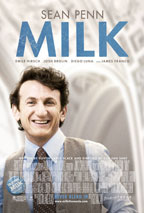
Milk
Starring: Sean Penn, Josh Brolin, Emile Hirsch, James Franco, Brandon BoyceDirector: Gus Van Sant
Genre: Dramas
Runtime: 2 hrs 8 mins
In 1977, Harvey Milk was elected to the San Francisco Board of Supervisors, becoming the first openly gay man to be voted into public office in America. His victory was not just a victory for gay...
In 1977, Harvey Milk was elected to the San Francisco Board of Supervisors, becoming the first openly gay man to be voted into public office in America. His victory was not just a victory for gay rights; he forged coalitions across the political spectrum. From senior citizens to union workers, Harvey Milk changed the very nature of what it means to be a fighter for human rights and became, before his untimely death in 1978, a hero for all Americans.
Sean Penn stars as Harvey Milk under the direction of Gus Van Sant in Milk, filmed on location in San Francisco from an original screenplay by Dustin Lance Black, and produced by Dan Jinks and Bruce Cohen.
Milk charts the last eight years of Harvey Milks life. While living in New York City, he turns 40. Looking for more purpose, Milk and his lover Scott Smith (James Franco) relocate to San Francisco, where they found a small business, Castro Camera, in the heart of a working-class neighborhood. With his beloved Castro neighborhood and beautiful city empowering him, Milk surprises Scott and himself by becoming an outspoken agent for change. With vitalizing support from Scott and from new friends like young activist Cleve Jones (Emile Hirsch), Milk plunges headfirst into the choppy waters of politics. Bolstering his public profile with humor, Milks actions speak even louder than his gift-of-gab words.
When Milk is elected supervisor for the newly zoned District 5, he tries to coordinate his efforts with those of another newly elected supervisor, Dan White (Josh Brolin). But as White and Milks political agendas increasingly diverge, their personal destinies tragically converge. Milks platform was and is one of hope - a heros legacy that resonates in the here and now.
Emile Hirsch Milk Interview
www.femail.com.au/emile-hirsch-milk-interview.htm
MORE
- Viggo Mortensen The Road
- 24 Cast Reunion
- Aaron Eckhardt No Reservations
- Aaron Eckhart The Dark Knight
- Adam McKay Step Brothers Interview
- Alan Alda Diminished Capacity Interview
- Alan Alda Diminished Capacity Interview
- Alex Dimitriades
- Al Pacino Oceans 13
- Alan Rickman Snow Cake
- Alan Rickman Sweeney Todd



